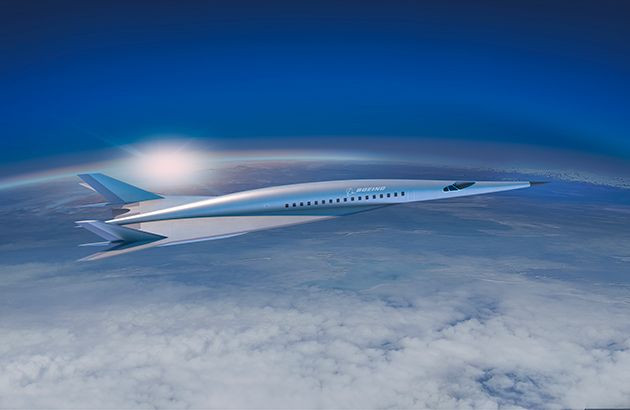Boeing’s Hypersonic Jet Could Cover New York To London In 2 Hours

As NASA continues to work on its supersonic jet or the famous X-Planet, aircraft manufacturer Boeing has unveiled a concept design showcasing what could be its first hypersonic jet — an aircraft capable of achieving speeds up to Mach 5 (five times the speed of sound; 3,900mph) and ferrying passengers or cargo from New York to London in just a matter of two hours.
The design, demonstrated this week at the American Institute of Aeronautics and Astronautics conference, shows a sleek passenger plane with a pointy nosecone, sweptback leading edges, and twin tail wings, just like one would imagine a drag-defying ultra-fast jet. Boeing further added the craft could even be employed into military uses.
In fact, according to a release from the company, the concept showcased in the conference is just one of the several hypersonic plane designs its engineers are studying to cater the varying range of potential benefits. This means by the time a scaled version of the craft is actually developed and tested, its design could be a lot different from what shown here.
“We’re excited about the potential of hypersonic technology to connect the world faster than ever before,” Kevin Bowcutt, senior technical fellow and chief scientist of hypersonics at Boeing, said in the statement. “Boeing is building upon a foundation of six decades of work designing, developing and flying experimental hypersonic vehicles, which makes us the right company to lead the effort in bringing this technology to market in the future.”
Speaking to Popular Mechanics, the researcher provided more insight into the project, revealing how the hypersonic craft would achieve the targeted speeds to challenge the likes of planes developed by Lockheed Martin and researchers working for Russia and China.
According to the report, the team at Boeing plans to use a commercial turboramjet engine, which should go past a range of speeds and provide the required boost to the craft without disintegrating during flight, as witnessed in the case of conventional jet engines.
“The turboramjet would be designed to valve the air so it bypasses the (turbofan) engine and dumps into a combined afterburner ramjet,” Bowcutt told Popular Mechanics. “That same afterburner would function as a ramjet.”
As that happens, the ramjet would provide the required thrust to take aircraft close to Mach 5 or maybe beyond.
This would be more than two times as fast as the Concorde, the only supersonic aircraft that ever managed to fly people across the globe. The top speed of the Air France and British Airways-operated Concorde was just a little over Mach 2, which allowed the plane to cover the distance between London and New York in three and a half hours. However, the plane was taken down after some flights due to the window-shattering sonic boom it produced.
Having that said, it will be interesting to see how Boeing tackles that problem when it gets the faster hypersonic plane ready. There is no word on when it might take to the skies or be developed, but as per Bowcutt, it could at least 20 to 30 years before we see commercial hypersonic planes in action.
© Copyright IBTimes 2024. All rights reserved.





















